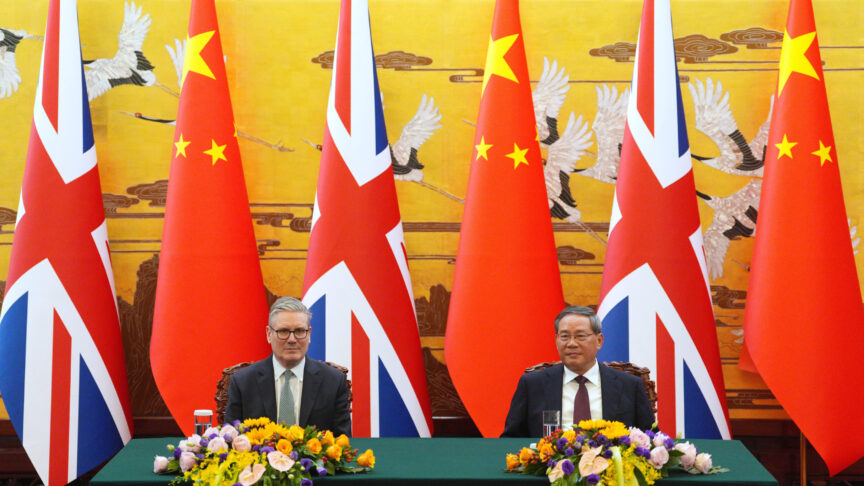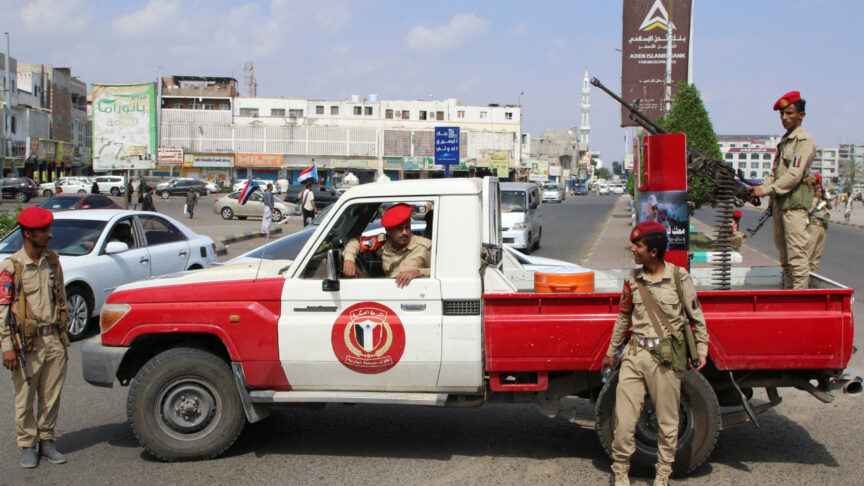Thirteen trends for 2016
What does the new year hold for Europe's foreign policy?
1. The proxy war between Russia and the US in Syria intensifies
One of the more underreported stories of 2015, has been the scale of the conflict between the two former Cold warriors in Syria. Such inattention suits both sides, and Washington and Moscow are keen to play up the prospects of a political consensus emerging on Syria.
But the facts on the ground remain unaltered by such diplomatic niceties: on the ground in Syria, rebel groups holding weapons supplied to them by the US are firing on Syrian armed forces supported and supplied by Russia.
Both sides genuinely fear getting dragged into the Syria quagmire and want de-escalation. But their own domestic politics and the ever worsening regional rivalry between their respective allies, Iran and Saudi Arabia mean they are unlikely to achieve those goals. The danger of escalation is very high, and indeed quite likely in the coming year.
Podcast on trends for 2016
You are currently viewing a placeholder content from SoundCloud. To access the actual content, click the button below. Please note that doing so will share data with third-party providers.
‘
2. Hardening of attitudes to refugees
This is perhaps the least surprising prediction. There is a growing sense in European countries that their governments have lost the ability to control their borders and the flow of people into Europe.
And this loss of control is feeding into a growing politics of fear. And this fear is subtly morphing itself country-by-country to prey on pre-existing worries. In Germany, increasingly local (and national) authorities fear that their hospitability to refugees will threaten Germany’s vaunted balanced budget approach. In France, security worries interweave with decades-old concerns about threats to French laïcité. Even in Sweden, long the champion of a liberal refugee policy, asylum seekers face new restrictions and hardening attitudes.
3. The slow erosion of consensus on Russia
In the last few weeks of 2015, there were rumblings at the EU council meeting that hinted towards the difficulty of renewing sanctions on Russia. With sanctions needing renewal every six months, these early signs point to the increasing difficulty of maintaining European solidarity on Russia.
There is an old rift in European politics on the subject. Eastern and central Europeans remain united in their support for sanctions, but some southern European states, with Italy as their mouthpiece at the last council meeting, remain unconvinced that the diplomatic and political gain from Russia sanctions is worth the economic pain. The sanctions on Russia may well survive the year, but even if they do the internal European debate will grow increasingly difficult and divisive
4. Britain re-enters Europe…
In the pre-Christmas period the British commentariat zeroed in on David Cameron’s difficulties with party management ahead of the UK’s “In-Out” referendum, anticipated for 2016. This isn’t anything new. Successive British governments – Labour and Conservative – have been engaging in Europe with one hand tied behind their backs, fearful of a potentially hostile public opinion and scheming backbenchers.
This might be about to change. On balance, it seems likely that the British will vote to remain in Europe. And if it does, it could signal a new era of engagement for Britain in Europe, with London returning to the European mainstream, potentially offering some leadership in difficult times. On its traditional areas of strength, such as defence and foreign policy, Britain has recently shown conspicuous support to its EU partners.
5. …As European solidarity erodes
The immigration crisis, coming quickly on the heels of the Ukraine and euro crises, has opened up a new and potentially more dangerous type of division within the EU. In the coming year, European solidarity will further erode as divisions on how to deal Europe’s fiscal mess and troublesome neighbourhood roil relations among the member states.
In this sense, Poland may be a harbinger of things to come. Under the previous Civic Platform government, Poland was a stalwart and effective pro-European voice, but the recent election win of Law and Justice (PiS) seems to have changed all that. In the coming year, Poland may well be hamstrung by domestic tensions, as controversy over recent reforms to the constitutional court rumbles on. And the Eurosceptic rhetoric issued by Law and Justice members may well drive a wedge between Poland’s government and the European mainstream.
The first casualty of this failure of solidarity may be EU foreign policy. European leaders will struggle even more than before to find meaningful consensus positions on critical foreign policy issues such as Turkey, Russia, and Syria.
6. Europe’s mainstream Canutes
In nearly every European country, the old established political parties are closing ranks to keep out increasingly popular populists. In the Spanish parliamentary elections, two new parties – Podemos and Ciudadanos ripped chunks out of the big parties’ vote and in France, tactical withdrawals from the Socialists were all that kept the Front national from electoral success in regional polls.
But the more the mainstream parties engage in electoral sleight of hand to try to turn back the populist tide, the more potent the message of exclusion becomes. Populists will breach the mainstream’s defences at some point. But if they do, they may find governing and populism incompatible, as Syriza have shown in Greece.
7. The nihilistic trend in extremist Islam
This worrying trend has its roots in the strategy practiced by Islamic State (ISIS) in Syria and Iraq, namely elevation of violence as a strategy instead of securing popular support. While other significant terror organisations like Al-Qaeda certainly deploy violence for political purposes, such violence is often targeted towards building support amongst a core Muslim support group.
What ISIS has proven in the last few years is that such PR concerns are not the be all and end all. Their violence is not aimed at securing mainstream or even widespread popular support, but at maintaining a steady flow of angry recruits to bolster their forces. Almost everywhere in the Middle East, ISIS is extremely unpopular, but the universality of their violence means this doesn’t really matter. Even if ISIS is forced onto the back foot militarily in 2016, this message has already been taken up by other terror groups, many of whom profess to be ISIS affiliates.
8. Germany becomes the US…
As Germany becomes more and more overwhelmed by the refugee crisis and faces up to intensifying domestic pressure, we will likely see it take on the foreign policy character of the US from previous decades.
It has already shown in recent times its readiness to flex its domestic and economic muscle to leverage European partners and, in the coming year, we will see this power deployed more frequently to assemble coalitions of the willing (and not-so willing) in Europe to serve its ends.
9. …As the US becomes Germany
As Germany becomes like the US, the US will move in the other direction. Increasingly, America’s foreign policy will become more and more defined by its own direct interests and it will hasten its move away from global watchdog.
In the American presidential campaigning thus far, we have seen very little internationalism, particularly amongst the Republican candidates. There is a growing sense that the US has seen little return from its long tradition of assertive foreign policy.
10. The rise and rise of geo-economics…
Countries around the world want to strike out at each other, but war-weary governments and publics mean military action is (in the most part) off the cards. So these countries are turning to alternative means of aggression that use the interconnectedness of the global system as a conduit.
Sanctions, economic boycotts, cyberattacks, public divestment campaigns and the development of alternative mulitateral groupings will all be seen in force in 2016. Even the movement of people is becoming a weapon, as Turkey’s effective wrangling with the European Union in early December proved.
11. …Except in Russia
Russia does use geo-economic tools and has, for example, imposed extensive sanctions. But can’t really compete with the biggest dogs in this area, limited as it is by its comparatively modest economy.
Russia’s comparative advantage remains its military, and unlike almost every other country in the world it is strengthening its armed forces. It is in the midst of long process of military modernisation which will continue. This modernisation includes an emerging doctrine of tactical nuclear use and this will spook the West in ways it hasn’t before.
12. No hard landing for China
In recent decades, China’s economic growth has been a reliable engine for the global economy. But the 2015 stock market crash has triggered severe worries that China’s economy is heading for a hard landing from its growth.
But 2016 is probably not the year of a hard landing for China. China has huge challenges in its transition from a manufacturing and export economy into one that relies more on services. But these challenges are manageable, at least for the next year. In any case, fears of massive contagion from a Chinese economic slowdown are overblown, at least for Europe. Limited non-Chinese exposure to the Chinese stock market and its positive current account and trade balances, mean that only a few may suffer seriously from a Chinese slowdown.
13. Turkey’s return to the West
The refugee crisis has made Erdogan and Turkey indispensable to Europe and the AKP’s shock election win has strengthened him domestically. But more broadly, Turkey’s wider strategy in the Middle East lies in ruins. They’ve isolated themselves from their Middle Eastern partners and have wrecked any chance of a relationship with Russia after the shooting down of a Russian jet.
In the absence of support in their eastern and southern neighbourhood, Turkey may have to turn back to the EU. It needs Europe as much as Europe needs it. The EU will have increasing leverage over Turkey (should it choose to use it) that could be used to get Turkey on board with a compromise political process to end the Syrian Civil War and particularly to prioritise the anti-ISIS struggle over the Kurdish issue in Syria.
Check out all trends and predictions since 2016 with this interactive tool.
The European Council on Foreign Relations does not take collective positions. ECFR publications only represent the views of their individual authors.


